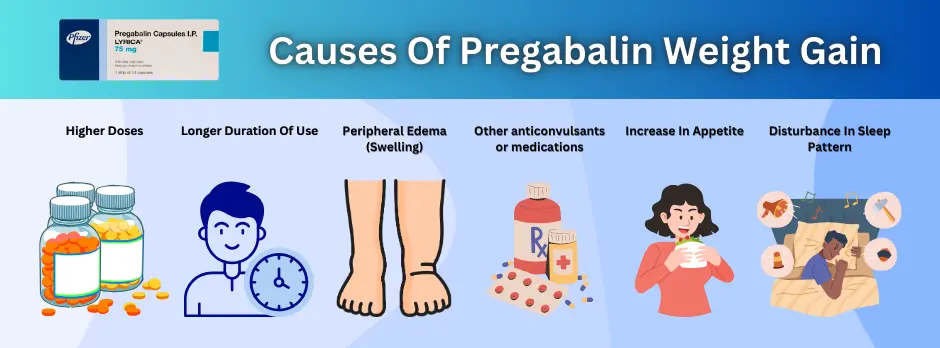Does Pregabalin Cause Weight Gain?

Pregabalin weight gain is caused by peripheral edema (swelling), an increase in appetite, and an interaction with other medications.
If you have been prescribed Pregabalin for conditions like nerve pain, anxiety, or fibromyalgia, you are likely familiar with its ability to provide relief from such symptoms. However, like any medication, pregabalin comes with its own set of potential side effects. One of the most commonly reported concerns among users is weight gain.
Whether it is a few extra pounds or a noticeable increase on the scale, many wonder: Is weight gain a side effect of Pregabalin? And if so, why does it happen?
In this blog, we will dive deep into the relationship between weight gain and pregabalin, exploring the science behind it, who is most at risk, and what you can do to manage or minimize this side effect.
What is Pregabalin?
Pregabalin is a prescription medication primarily used to treat a variety of conditions that involve nerve pain, anxiety, and certain types of seizures. It belongs to a class of drugs known as anticonvulsants that work by calming overactive nerve signals in the brain. This helps reduce pain and seizures while promoting a sense of relaxation. It also affects certain neurotransmitters that can influence how the body regulates appetite and fluid balance. This is why some people may experience weight gain while taking Pregabalin.

Pregabalin is available in numerous brand names, such as Lyrica and Nervigesic. It is commonly prescribed for treating conditions such as neuropathic pain, fibromyalgia, generalized anxiety disorder (GAD), and seizures [1].
Why Does Pregabalin Cause Weight Gain?
Several factors may increase the likelihood of weight gain while taking Pregabalin-

Higher Doses and Longer Duration of Use-
Studies suggest that weight gain tends to be more significant in patients taking higher doses or those on long-term treatment. A 2021 study on weight gain in individuals taking Pregabalin suggests that patients taking higher doses of Pregabalin gained an average of 6.5 lbs, compared to just 3.6 lbs in those taking lower doses [4].
Fluid Retention
Weight fluctuations while taking pregabalin are also linked to peripheral edema or fluid retention, which causes swelling in the hands, legs, and feet [5]. This condition can contribute to changes in body weight due to fluid retention.
About 6% of people taking Pregabalin experienced peripheral edema, compared to only 2% of those taking a placebo [2]. However, it is essential to understand that this weight gain is due to fluids, is not the same as fat gain, and is much easier to lose.
Other Medications or Conditions-
If you are taking multiple medications, particularly other anticonvulsants or medications that can affect metabolism, you may be at higher risk for weight gain. A 2008 study on weight gain from Pregabalin therapy in patients with epilepsy suggests its use led to weight gain in many patients, with an average increase of 4 kg over six months. The change in body mass from taking Pregabalin was higher in patients taking multiple epilepsy drugs. The study further indicates the causes for this variation in weight could be increased appetite, changes in metabolism, and fluid retention [6].
Pregabalin And Increased Appetite
A 2018 study by Hiroko Ikeda et al. suggests that the possible reason for the increase in body weight from taking Pregabalin is its effect on the brain’s dopamine system. It mainly affects a region called the lateral hypothalamus (LH), which controls hunger and energy balance. Pregabalin lowers dopamine levels in the LH after eating, which may reduce the feeling of fullness and increase food intake. This can lead to overeating, especially when combined with other side effects like fatigue or sluggishness [7].
Disturbance In Sleep Pattern
Pregabalin can affect sleep patterns, and lack of sleep can lead to weight gain through hormonal imbalances that increase hunger.
Pregabalin And Insulin Resistance
Pregabalin may impact blood sugar levels and insulin resistance, making it harder for the body to utilize insulin effectively. This can lead to elevated blood sugar and increased fat storage. For such people, weight loss can be more challenging as excess glucose is stored as fat.
To learn more, refer to the article on the effects of insulin resistance on weight gain by Scripps.
How Common Is Weight Gain With Pregabalin?
Weight gain is one of the most commonly reported side effects of pregabalin. In clinical studies, about 9% of adults taking this medication experienced a weight gain of 7% or more of their initial body weight. In comparison, only 2% of those taking a placebo (inactive treatment) reported similar weight changes [2]. However, it is important to note that weight gain does not occur in everyone. Approximately 10% of Pregabalin patients report minimal to moderate weight gain [3].
How Much Weight Gain Can You Expect?
On average, patients taking Pregabalin experience moderate weight gain. In clinical studies, the average weight gain for individuals taking Pregabalin was approximately 1.6 kg (3.5 lbs) compared to 0.3 kg (0.66 lbs) in those on placebo [2]. However, the weight gain can vary significantly from person to person.
In longer-term studies, such as those involving diabetic patients, the average weight gain was around 5.2 kg (11.4 lbs) over 2 years [2].
How To Avoid Weight Gain On Pregabalin?

If you are concerned about weight gain while taking Pregabalin, here are some strategies to help manage your weight.
- Pregabalin can increase appetite, so being mindful of portion sizes and food choices is essential.
- Managing cravings for pregabalin can be done by focusing on vegetables, lean proteins, whole grains, and healthy fats. These foods can help keep you full without adding too many calories.
- Avoid weight gain due to water retention by staying hydrated and avoiding high sodium (salt content) food.
- Walking, swimming, cycling, or running can help lose weight. Weight training can increase muscle mass, which helps with metabolism and fat loss.
- Aim for 7 to 9 hours of quality sleep every night.
Other Notable Side Effects Of Pregabalin
Pregabalin is generally well-tolerated by many people, but like any medication, it can come with side effects. Most users experience mild to moderate side effects that usually subside as the body adjusts to the drug.
Some side effects of Pregabalin include-
- Dizziness
- Drowsiness
- Nausea
- Dry mouth
- Vomiting
- Blurry vision
- Trouble breathing [8]
Pregabalin and Metabolic Changes- Pregabalin can also affect the way the body processes and stores food. This can slow down metabolism or lead to more fat being stored, causing weight gain.
A rare but notable side effect of pregabalin is hair loss, which, though uncommon, can occur in some individuals. This side effect is temporary and may resolve within a few weeks after discontinuing the medication.
Alternatives to Pregabalin with Fewer Weight-Related Concerns
Suppose you are experiencing weight gain as a side effect of Pregabalin and are seeking alternative treatments for managing body pain. In that case, two potential options to consider are Carisoprodol (Soma) for muscle pain and Tapentadol for severe chronic pain. Each treatment option has its unique benefits and considerations, which can help you make an informed decision based on your specific needs.
Carisoprodol (Soma) for Muscle Pain
Carisoprodol, commonly known as Soma, is a muscle relaxant used to treat acute musculoskeletal pain. It works by blocking pain sensations between the nerves and the brain, relieving discomfort caused by muscle spasms, strains, or injuries.

Key Considerations-
- Carisoprodol is usually recommended for short-term relief due to the potential for dependence.
- Some common side effects include dizziness, drowsiness, and headaches. It is essential to avoid alcohol and other sedatives while using this medication.
Tapentadol for Severe Chronic Pain
Tapentadol is a potent opioid pain medication that is prescribed for severe chronic pain, such as that caused by conditions like neuropathy, osteoarthritis, or fibromyalgia.
It works by binding to the opioid receptors in the brain to block pain signals and also inhibits the reuptake of norepinephrine, which helps in managing pain more effectively. Tapentadol is generally considered a safer option than other opioids, with a lower risk of abuse and fewer gastrointestinal side effects.

Key Considerations-
- Common side effects of Tapentadol can include nausea, dizziness, constipation, and drowsiness.
- Tapentadol is classified as a controlled substance and should be used under close medical supervision.
Pregabalin And Weight Gain- Our Final Thought
Weight gain is a known side effect of Pregabalin, but it tends to be moderate and varies from person to person. Clinical studies suggest that around 9% of individuals taking Pregabalin may experience weight gain. However, this does not mean everyone will gain weight. The change is minimal to moderate for many, about 1.6 kg (3.5 lbs). In longer-term studies, such as those with diabetic patients, the average weight gain may be higher, around 5.2 kg (11.4 lbs) over two years.
For those who do experience weight gain, lifestyle changes like adjusting diet and exercise routines can help manage the effect. If weight gain becomes a concern, discussing it with your doctor is key to finding the most suitable approach for your health.
FAQs
What is the average weight loss after stopping Pregabalin?
Is it hard to lose weight on Pregabalin?
Does Pregabalin make you hungry?
Why does Pregabalin make you gain weight?
Can you lose weight on Pregabalin?
What dosage of Pregabalin causes weight gain?
Is reversing Pregabalin weight gain possible?
How to take Pregabalin and not gain weight?
Does Pregabalin increase your appetite?
Does Pregabalin cause water retention?
Is weight gain a side effect of Pregabalin?
Does stopping Pregabalin help with weight loss?
Can exercise prevent weight gain from Pregabalin?
Does everyone gain weight on Pregabalin?
Pregabalin-induced bloating vs. weight gain, which is more common?
Can pregabalin cause weight gain?
In Pregabalin vs Gabapentin weight gain, which is more severe?
Can you suggest Lyrica alternatives because of weight gain?
How does Lyrica cause weight gain?
References
- Pregabalin, Wikipedia.
- Does Lyrica cause weight gain? Drugs.
- Does Lyrica Cause Weight Gain? Recovered.
- Weight Gain in Veterans Taking Duloxetine, Pregabalin, or Both for the Treatment of Neuropathy, mdedge.
- Pregabalin, Oral Capsule, healthline.
- Bodyweight gain under pregabalin therapy in epilepsy: Mitigation by counseling patients?, ScienceDirect.
- Pregabalin increases food intake through dopaminergic systems in the hypothalamus, PubMed.
- Pregabalin Capsules, Cleveland Clinic

 info@iyrinhealth.com
info@iyrinhealth.com



